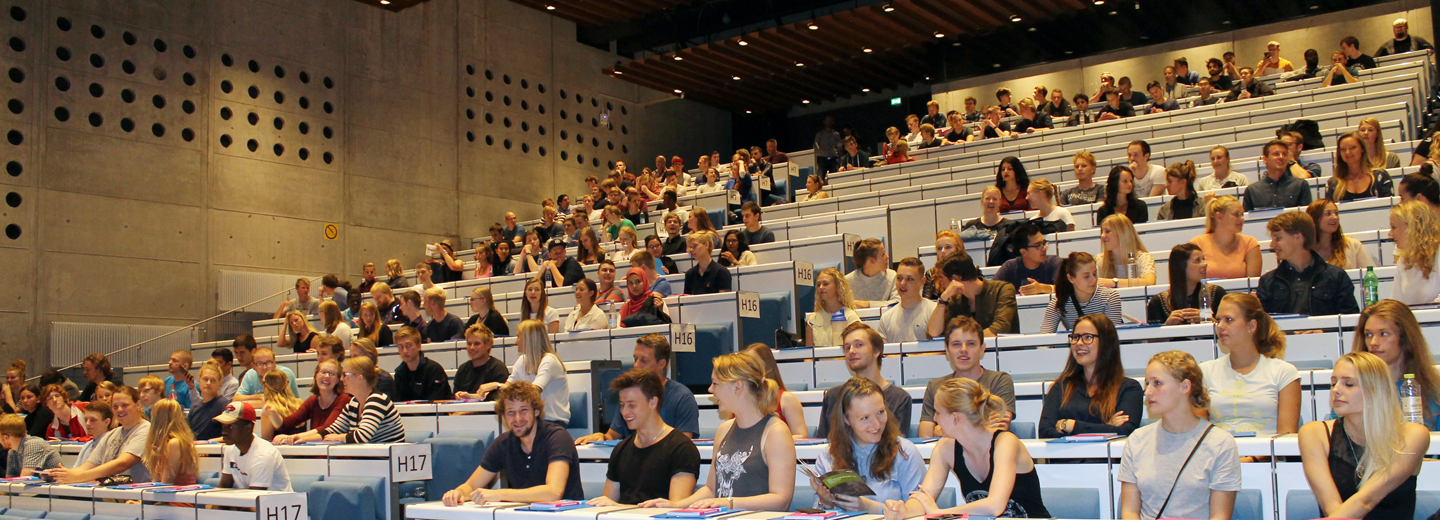
This year's intake of students to the faculty is satisfactory
The Faculty of Science welcomes almost 500 new students this week.
The number is almost the same as last year, but in the light of the number of students admitted to science programmes at national level and to SDU as a whole, there is still reason to be pleased with the result. In addition, this year the faculty has had a fine influx of applicants for the master's programmes.
All Danish universities have recorded a decline in the intake of students compared to last year. SDU has the largest decline of 12 %. The University of Copenhagen is down 2 %, the University of Aarhus is down 3 % and the IT University of Copenhagen is down 10 %.
If we look at SDU's decline by faculty, the Faculty of Engineering has the largest decline of 22 %. However, it must be kept in mind that the engineering programmes have introduced stricter entry requirements this year. The humanities programmes are down 16%, business and social science programmes record a 9 % decline and health science programme are down 4 %. The Faculty of Science records a 1 % decline and thus maintains almost the status quo compared to last year.
– At national level, there is a 7 % decline in the intake of science students, which is a pity for the entire area, but seen in that perspective, the faculty's admission numbers are satisfactory this year, says Head of the Faculty Administration Niels Kring.
The two dimensioned programmes, Biology and Biomedicine, have had an increase in the number of applications, which has increased the grade point average of those admitted. This year, both programmes are among the 17 SDU programmes that have a grade point average and rejected applicants. Biology has offered 76 student places, while the number for Biomedicine is 112.
Pharmacy has offered 128 student places this year.
Chemistry has recorded the biggest increase of the year in student places offered, compared to other Science programmes. Last year, the programme admitted 16 students, while 25 student places have been offered this year. The figures are relatively small, but compared to 2017, when Chemistry took in only 11 new students, a much-needed increased interest in the programme can be noted.
Like Chemistry, Physics has had some years with a small intake of students (less than 20 students in both 2017 and 2018), and although Physics has experienced a decline in the intake of students, from 28 in 2020 to 27 this year, the programme is in a positive development.
Biochemistry and molecular biology records a decline of two fewer places offered than last year.
Mathematics and Applied mathematics have a decline in student places. Combined, the two programmes have taken in 55 students this year, whereas 68 students were taken in last year. Computer science records the faculty's biggest decline. In the intake of students, the Computer science programme falls from 90 last year to 74 this year. Already in 2020, Computer science experienced a decline compared to the previous year.
– It is difficult to find the reason for the decline we are experiencing at Computer science, says Niels Kring.
– Over the past year, IMADA has launched increased marketing in collaboration with the Faculty Administration, just as they have been diligent in holding camps, online courses in programming and several other outreach offers. However, in 2020 it was not possible to have as many physical visits to the high schools. At national level, applicants can also choose between 18 so-called heavy IT programmes, so the competition to attract young people is also relatively fierce, says Niels Kring.
This year, the Faculty of Science has offered student places to 569 bachelor applicants, which is 11 fewer than last year. So far, a total of 485 have accepted the offer.
The commencement of studies these days does not only apply to the new bachelor students. 372 are starting a master's degree programme in science, and although some programmes are experiencing a decrease in the influx of applicants compared to last year, the faculty has an overall increase of 26 %.
– It is really gratifying to see such great progress overall. In addition to the fact that we are good at retaining our students in the transition from bachelor to master, we fortunately also recruit many master’s degree students from other institutions, says Vice Dean Poul Nielsen.
–It is also a great success for both IMADA and the faculty that the relatively new master's programme in Data science is taking in 146 students this year, continues Poul Nielsen.
– It is also gratifying that one of our two new 1-year master programmes, namely in Climate adaptation, has had a great influx of applicants already this year, while Environmental chemistry and management will probably receive enough applications until they are set up only next year, concludes Poul Nielsen.